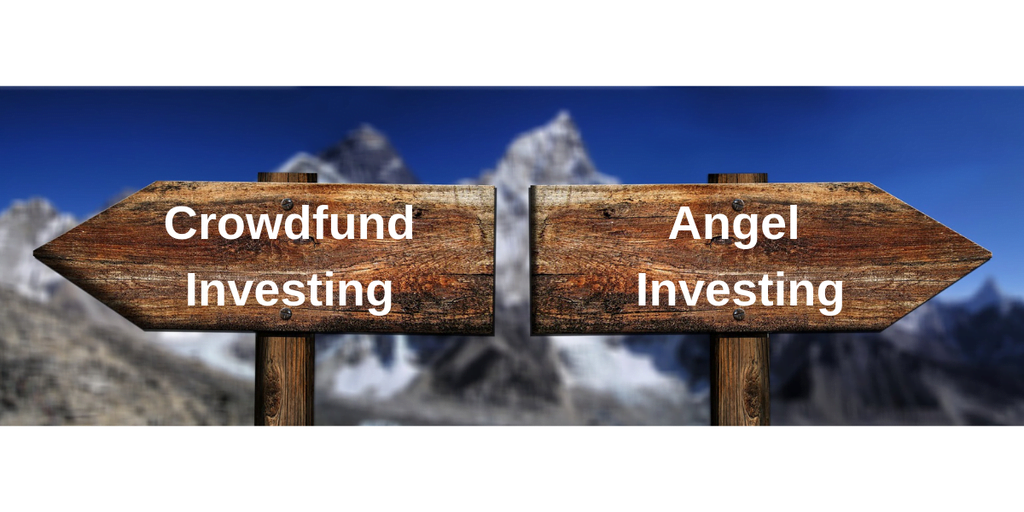Crowdfund Investing vs. Angel Investing – 5 Ways They Differ

Thinking of equity crowdfund investors as “micro angel investors” may hold some truth, but there are also some crucial differences that investors should be aware of.
We define angel investors as individuals who dedicate a significant amount of time and capital to early and growth-stage investments. Angels are one of the few (or only) major investors during early investment rounds.
Equity crowdfunding – which includes Regulation D (Reg D, for accredited investors), Regulation A+ (Reg A+) and Regulation Crowdfunding (Reg CF) – is the online fundraising of capital from a “crowd” of investors in exchange for equity in the business.
So, what are the differences between angel investing and equity crowdfund investing? And which differences are potential advantages to crowdfund investors?
Five key differences between angel investing and equity crowdfund investing are:
- Legal limits and restrictions
- Deal flow and finding deals
- Diversification potential (geographic and financial)
- Due diligence and access to founders
- Investor Rights and Responsibilities
For resource-limited angel investors who can’t dedicate the time or capital required to be successful as an angel, equity crowdfunding is a great option to still invest in startups.
1 – Legal differences between angel investing and crowdfund investing
The Securities and Exchange Commission (SEC), businesses, and other organizations impose different legal limits on angel investors and crowdfund investors.
Eligible deals: first, whether an investor is an accredited or non-accredited investor will determine the types of deals that any investor can participate in. For example, non-accredited investors cannot invest in offerings under Regulation D. In most cases, a non-accredited investor could not fly out to Silicon Valley and decide to invest in a private startup like an angel investor could.
Investor limits: next, regardless of investor accreditation, all investors in Reg CF are restricted to the total capital they can legally invest over a 12-month period. Furthermore, non-accredited investors are limited to how much they can invest in Regulation A+ (Tier II) offerings.
Restrictions on secondary shares: lastly, Reg CF imposes specific restrictions on selling shares on secondary markets, such as a minimum 1-year holding period. For angel investors (as with founders or other early-stage shareholders), there are additional rules imposed by either the SEC, the business, or investment banks. These laws and rules may limit (and sometimes prevent) the sale of secondary shares. Some examples are: the right of first refusal, IPO-lockup periods, and other restrictions.
2 – Deal flow and finding deals – angel investing vs. crowdfund investing
Deal flow: as an angel investor or venture capitalist, your network of angels and VCs is crucial to gaining access to the best deals. This network of founders, investors, and others who pass along potential investment opportunities and make introductions makes up an investor’s deal flow. It describes both the quantity and quality of deals that any potential investor sees go across their desk for evaluation.
Networks and deal flow often depend on your reputation as an angel investor. Are you a pleasure to work with and helpful to your founders? Or do you try to squeeze the most out of everyone without caring about how it impacts others?
For crowdfund investors, deals listed on public funding portals are available to everyone. The advantage of crowdfund investing is that all investors in Reg CF have equal deal flow, similar to how stocks and bonds on public exchanges are equally available to all investors.
Because of this, individual investors’ performance won’t depend as much on deal flow or reputation as it does for angel investing. Crowdfund investors have an easier time viewing a large quantity of deals posted on funding portals, but they have to spend more time sifting through all the offerings to determine the quality of each of those deals.
Due to the public offering of equity crowdfunding deals, investors aren’t able to get the same unfair advantage that angels can have by gaining exclusive access to a closed deal. Think of the unfair advantage that Peter Thiel had when Reid Hoffman introduced him to Mark Zuckerberg in 2004, leading to Peter’s angel investment in Facebook (the first from an outside investor).
For some of the hottest angel deals, it is often the founders who can choose which investors they want, not the other way around. That isn’t the case with equity crowdfunding – which can be viewed as both a pro (everyone has access) and a con (everyone has access).
Finding deals: crowdfunding offerings – which have limited availability via campaign maximums – are publicly available and easier to search through than angel investments. It’s possible that demand for a crowdfund offering exceeds supply, and investors may be put on a waiting list. Reg CF investing is still catching on, and so getting into rounds hasn’t been too much of an issue for crowdfund investors (yet).
Limited information: businesses that use equity crowdfunding may restrict the amount of information they make publicly available beyond the minimum disclosures that are legally required. Doing so would make this sensitive information available to competitors, and it is reasonable to be cautious. Thus, crowdfund investors may not always get the same level of detail that angel investors would get on certain business operations or financials.
Quality of deals: one common criticism of equity crowdfunding is that only businesses that would have trouble raising from traditional sources – such as angels and venture capital – will raise funds through Reg CF. Thus, some people think funding portals may only have second-class deals.
While we won’t be able to objectively assess the accuracy of this hypothesis until we see future results, businesses are starting to recognize that there are some unique benefits to running an equity crowdfunding campaign. That being said, it isn’t the right choice for everyone.
And while it’s accurate that investors will find more non-traditional investing opportunities (i.e. those that wouldn’t be able to attract angel or VC funds due to being more of a lifestyle business), that is one of the exciting ways that equity crowdfunding is changing the funding landscape. Not all investors are looking for maximum financial gains; some just want to support a local business, like a brewery, or perhaps a new film, and find it exciting to help bring those ideas to the world.
As long as crowdfund investors understand that they will have to sort through both types of businesses, more diverse deal quality can instead be viewed as a positive aspect of equity crowdfunding rather than a negative one.
3 – Diversification differences between angel investing and crowdfund investing
Geographical diversification: one advantage of listing deals on funding portal’s websites is that investors can review and invest in deals anywhere across the country.
It is no longer necessary that you must be located in Silicon Valley, the Bay Area, or other tech hubs to get access to the best deals.
Financial diversification: with investment minimums as low as $100 (or even $10 per deal), this makes it much easier for investors to diversify among many startups.
As an angel investor with $100k to invest, writing $25k checks means that you can only invest in four companies. And investing in fewer than 10-20 companies is a losing strategy based on startup failure rate statistics.
With equity crowdfunding, even with a portfolio of just $10,000 (or $1,000), one can easily diversify among 10, 20, or even 50+ startups.
This allows investors to take advantage of the power law nature of startup returns, while using diversification to mitigate the risk of losing money.
Even active angel investors who write $25k+ checks should consider the advantages of adding smaller allocations to equity crowdfunding businesses to their portfolio.
4 – Due diligence and access to founders – angel investing vs. crowdfund investing
Direct Access to Founders: for angels, it is an expectation that a founder of a potential investment will meet you in person, since you are committing a much larger check to the round. This type of one-on-one exposure isn’t possible for the founder of an equity crowdfunding campaign with hundreds (or thousands) of investors.
To combat this downside when conducting due diligence, crowdfund investors can leverage the wisdom of the crowd. Look at the questions that are publicly posted on the campaign page and answered by the founders. Using other social networking and research tools such as LinkedIn, Crunchbase, and Google searches can also help with due diligence on equity crowdfunding offerings.
Also, services like Kingscrowd provide some of this face-time with founders by holding interviews and webinars. This gives crowdfund investors access to the founders that they normally wouldn’t get as a solo investor. Kingscrowd also offers an equity crowdfunding rating service as a subscription, which can complement your own due diligence process. [Disclaimer: I am an investor in and current user of Kingscrowd].
5 – Investor rights and responsibilities – angel investing vs. crowdfund investing
Influence over the business’ direction: angels and VC firms often directly influence the companies that they invest in. Whether it’s by private phone calls with the founder, or formal board meetings to determine the future of the business, investors who own a much larger stake have more direct influence over their investments.
With equity crowdfunding, investors may have limited, if any, say over the future direction of a company or major decisions.
Limited investor rights: other rights that angels expect to see – such as pro-rata rights, information rights, and voting rights – will also be limited or absent from crowdfunding term sheets.
This is a tradeoff that crowdfund investors must live with. For the smaller amounts of capital and time invested in a business, crowdfund investors should look at their Reg CF investments as being passive investments compared to more active angel investments. This does not mean that Reg CF investors are helpless, though; often, early-stage companies that use equity crowdfunding will still find innovative ways of engaging and leveraging their earliest investors.
Less time and responsibility: with fewer rights and less capital on the line, a crowdfund investor typically has fewer responsibilities than an angel investor. This means each startup investment should take less time to manage for the crowdfund investor. Without the requirement to sit on boards, take one-on-one calls with the founder, make helpful introductions, or provide mentorship, crowdfund investors should have the bandwidth for a larger number of startup investments in their portfolio.
This is one hidden benefit of having less control over your investments. And psychologically speaking, we are often our own worst enemies when it comes to investing, so taking the steering wheel out of our control may even be a positive thing.
Negotiations: crowdfund investors have no ability to negotiate over deal terms. Once a valuation and other deal terms are posted on a funding portal, those same terms are the only ones available to all potential investors for the current campaign (except for formal changes that are properly filed). With angel investing, there are negotiations over key points such as valuation caps, discount rates, investor rights, board seats, ownership stakes, and other deal terms; think of the investors negotiating on Shark Tank.
Summary of Angel Investing vs. Crowdfund Investing
While equity crowdfund investing will give investors less direct access to founders and less direct control over an investment than an angel investor, there are many advantages that equity crowdfunding offers to investors.
The benefits of crowdfund investing – such as the ability to invest in any company regardless of location, easily diversify across many startups, and treat equity crowdfunding as passive rather than active investments – helps Reg CF investing appeal to investors who want to invest in startups, but who can’t commit the time or capital required to be an angel investor.
For this reason, even wealthy, accredited investors who could legally be full-time angel investors should consider equity crowdfunding for their portfolios. Beyond Reg CF funding portals, other accredited investor options include joining angel groups or equity crowdfunding sites such as AngelList or FundersClub.
Are you ready to learn how to start investing in startups and what it takes to build a successful startup portfolio? Check out our free courses at Crowdwise Academy and learn how to get started in crowdfund investing today.






Responses